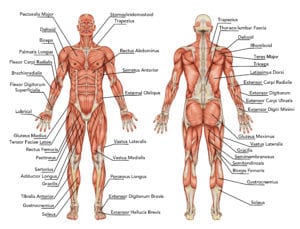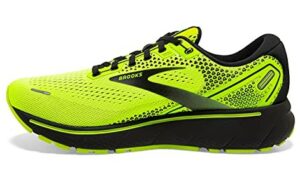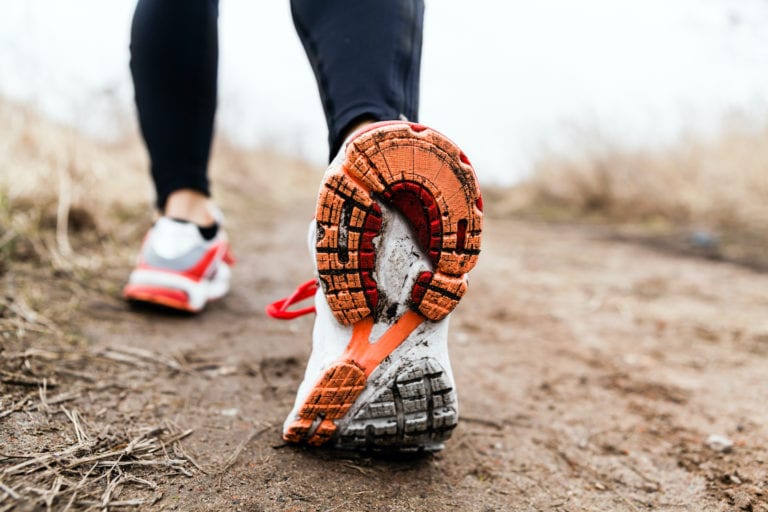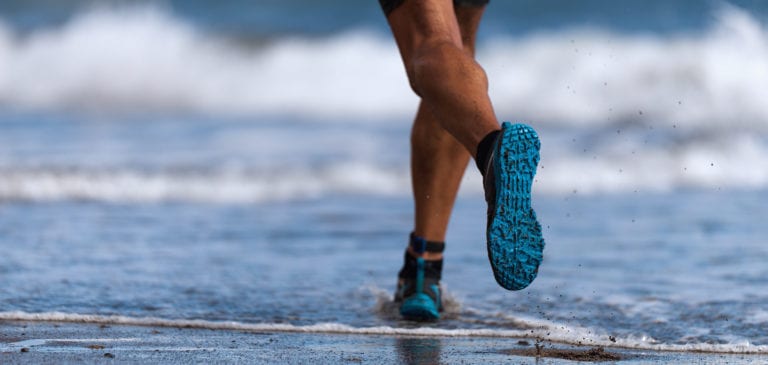Most people experience a pins and needles sensation of your “foot falling asleep” after sitting too long, but what if it happens during activity? If you notice your toes or feet go numb when running, it could be disconcerting, especially if you don’t know the cause.
Numb toes or feet when running isn’t unusual, and it can happen for several reasons. If you’re not certain what’s causing your numbness, this list may help you figure it out and how to stop it!
What Causes Toe or Foot Numbness?

Thankfully, most causes of numb feet while running are relatively easy fixes. However, it may take some trial and error to figure out the source of your numbness.
Your Shoes Don’t Fit Properly
Ill-fitting shoes can cause numerous problems, including foot pain and numbness. Shoes that are too tight can compress your nerves and cause foot numbness. If you think your current shoes could be the problem, it’s time for a new pair of shoes.
You may want to consider a trip to a specialist – a running shoe store. Many running shoe stores offer shoe evaluations to assess your foot shape and how you run to find the right type of shoes for you. For example, maybe you have wide feet and need more room in the toe area or you’re the opposite and require narrow shoes for support.
Choosing the right shoe size for running can be a challenge because it’s not the same as picking up a pair of street shoes. Many runners go up at least a half size from their usual size to account for foot swelling during a run. In fact, it’s not unusual to go up a full shoe size.
You Tie Your Shoes Too Tight
Lacing your shoes tight can give you a good fit around your ankle, but it can also impact the nerves across the top of your foot. Much like carpal tunnel in the wrists, tarsal tunnel syndrome affects nerves around your ankle causing foot numbness and pain.
Remember, your running shoes should feel snug on your feet without compressing the top of your foot or impacting blood flow. Try loosening the laces around your ankle to see if that helps the numbness. You may need to experiment with different lacing techniques and lacing patterns to find one that works better for you.
If a modified lacing technique doesn’t work for you, it may be time to drop those traditional laces and try elastic laces. You can also try inserting some padding under the shoe’s tongue to improve the fit.
You’re Training Too Hard
Overtraining is another common cause of numb toes when running. It’s easy to start fast and hard or push yourself to longer distances before your body is ready. Whether you’re a beginner or seasoned runner, it’s important to take time building up your distance and intensity.
Try reducing your distance or training time to see if it alleviates your numbness. If that works, increase your conditioning time in increments until you reach your goal without having numbness.
Check Your Footfall
Toe numbness after running can also stem from how you run. If you don’t use proper form, you could put yourself at risk of more than numb toes after running. Overstriding also expends more energy and can lead to shin splints.
You can correct overstriding by shortening your stride to land on the midsole of your foot instead of your heel first. However, you may want to visit a physical therapist for assistance in correcting your stride.
You May Need Orthotics
Would you be surprised to know that your foot structure could be causing your numbness when running? We all have unique foot shapes, and running can be problematic for people with high arches or flat feet.
Usually, orthotics can relieve foot pain and numbness by adding support for your entire foot. While you could pick up orthotics from your local pharmacy, you may want to head to the running store or a podiatrist to see about custom shoe inserts.
You Might Need to Stretch More
Though it may not be the first thing that comes to your mind, muscle tightness could factor into toe and foot numbness when running. When your muscles are too stiff or inflexible, they can trigger pressure on nerves in your feet.
Consider how you feel after sitting at a desk or in a car all day. You may have stiffness in your lower back and hips, and you could even feel pressure on your sciatic nerve. Then you go for a run and those tight muscles still impact the nerve, which can affect your entire lower body.
Unless your tightness relates to a muscle trauma or unusual muscle anatomy, you may want to try improving your flexibility with different forms of exercise. Yoga makes for excellent flexibility exercise and helps with overall body alignment, which could improve your running form.
Altering your warm-up exercises could have an impact on the foot and toe numbness by releasing some of that tension and tightness. However, it may help to incorporate sports massage or see an exercise physiologist for additional suggestions.
It Could Be A Medical Condition
If none of the above situations and remedies resolves your foot and toe numbness, you may need to see a physician to rule out a medical condition. Your doctor can assess your situation to see if these conditions apply, and can advise you about treatment options.
Arthritis, Bone Spurs and Bunions
Arthritis, bone spurs, and bunions can affect the blood supply to your feet or impinge on your nerves to trigger numbness. These conditions generally develop over time, but can significantly impact the shape of your foot leading to foot deformities.
Whether it’s through genetics, injury, or the way you walk and run, foot deformities should be evaluated by medical professionals. You may need to have x-rays and see a podiatrist. Treatments can range from orthotics and new shoes to cortisone injections and even surgery.
Morton’s Neuroma
Morton’s neuroma affects the ball of your foot and radiates to the space between your third and fourth toes. The tissue thickens around one of the nerves in your foot resulting in nerve compression that causes pain and numbness.
Fortunately, Morton’s neuroma isn’t serious. To alleviate symptoms, you may need to switch to shoes with more toe space or incorporate special pads to offset the pressure. In severe cases, doctors may also suggest injections or surgery.
Peripheral Neuropathy
Peripheral neuropathy is a medical condition that causes foot and toe numbness. The numbness occurs due to nerve damage, and it’s often the first indication that a person has diabetes. If you suspect that peripheral neuropathy could be causing your numbness, it’s important to see your doctor as soon as possible to discuss your options.
What If I Have Numbness During Other Activities?
What if you have numb feet when running but not while doing other exercises, like cycling or just walking. If you experience numbness and tingling during other parts of your day, you may want to speak with a doctor or physical therapist. Detailing exactly when you experience numbness could help identify the exact cause and lead to a swift solution.
Final Thoughts
Looking over this list, it may be easy to dismiss your numbness and run through it. However, while you can correct many of these conditions, it’s important to note that some of them can evolve into bigger problems if you don’t remedy them.


























